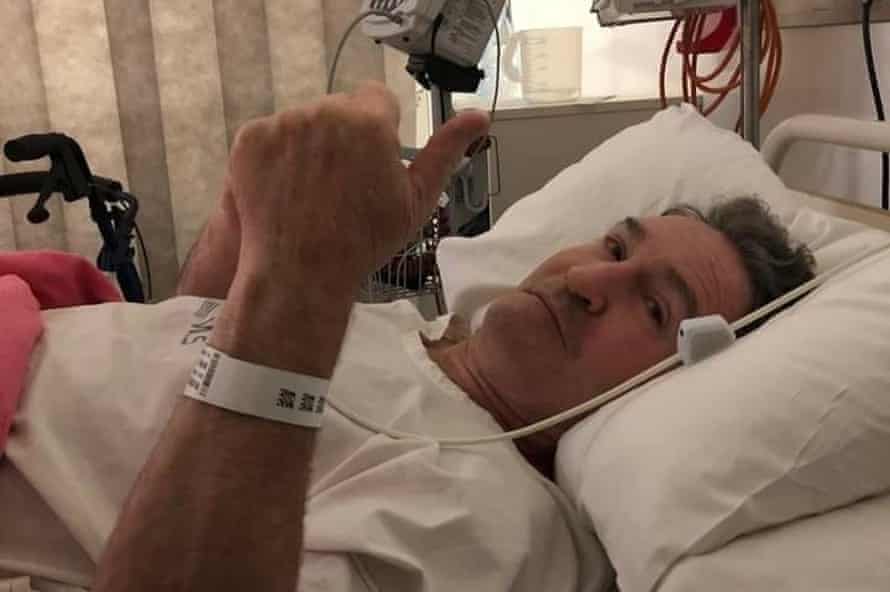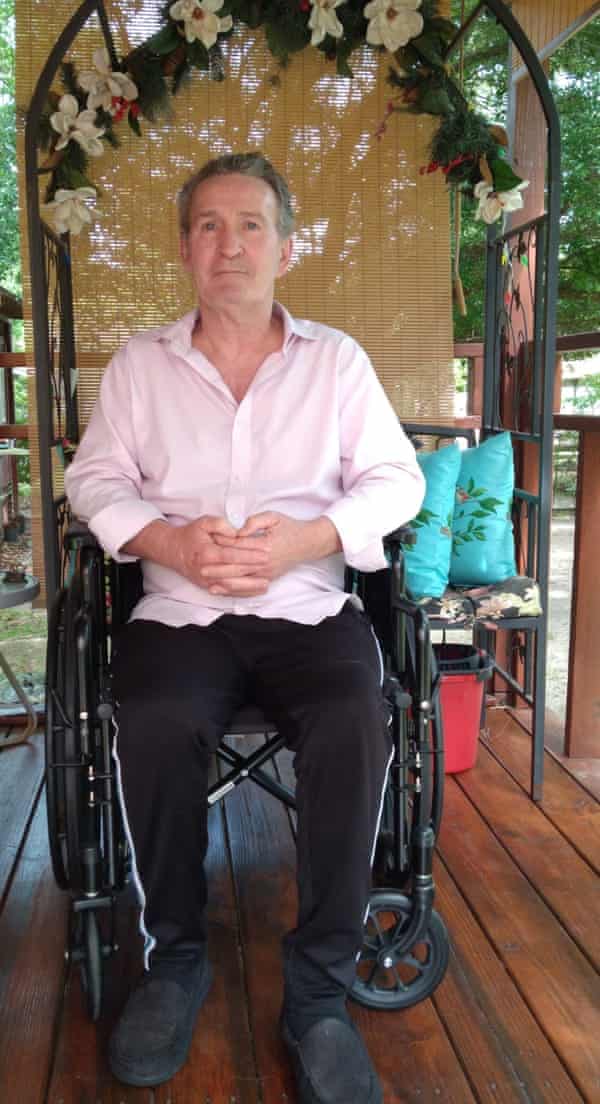The Coalition government’s delayed vaccine rollout might have caused frustration and a resulting slump in the polls for Scott Morrison, but for Australians stranded overseas and expats with family abroad, abandoned vaccination targets can be a matter of life and death.
After international borders shut in March last year, Andre Rivenell was forced to live in a campervan with his wife, Melissa, in his mother-in-law’s Texas backyard while waiting for his cancelled Air New Zealand flight home to be rescheduled. The couple arrived in Texas in late 2019 to visit Melissa’s mother after she was diagnosed with cancer.
Rivenell has Parkinson’s disease. Centrelink cut off his disability pension payments last April after he wasn’t able to provide proof of his disability from overseas (he needed to be in Australia to reapply). The couple were unable to afford the new flights back to Melbourne as prices skyrocketed in line with shrinking quarantine arrival caps. They resigned to waiting it out, hoping eased border entry would bring their return within reach.
That changed in December, when Rivenell suffered a stroke, and was taken to a Houston hospital where he was also diagnosed with myasthenia gravis, a chronic autoimmune neuromuscular disease that causes rapid fatigue. There is no cure.
Despite recommendations from hospital doctors for urgent treatment, the 63-year-old has not been able to afford medical costs in the US, as he is not insured in that country.
He is yet to undergo rehabilitation for his stroke, and a doctor has warned the longer his flight is delayed, he risks deteriorating to a condition where he will never be able to travel again.
“We’re penniless,” Rivenell told the Guardian, in a noticeably strained tone that he attributes to his recent stroke.
“We just don’t have the funds for the proper medication, and we can’t afford tens of thousands for flights and quarantine,” he said.

Rivenell registered as stranded with the Department of Foreign Affairs and Trade in the middle of 2020, but given his financial predicament and newfound urgency, he asked his son Jude, a 19-year-old in the Royal Australian Navy, to apply for the department’s financial assistance to provide emergency loans to help stranded Australians return home.
But his application has been rejected twice, with requests for further medical information and proof that Rivenell’s mother in-law cannot afford to help them fly home.
“We have sent all medical records, letters from doctors, everything they could possibly want. They keep moving the goalposts, and we’re getting every door slammed in our face.”
Without financial support, Rivenell has set up a GoFundMe page to take donations.
The couple have both had their first dose of the Moderna vaccine, and will be fully vaccinated in coming weeks. They are desperate for clarity from the federal government about if or how entry conditions for Australians vaccinated overseas will be eased.
Comments from the prime minister this week have given them little hope their vaccinated status will help them return to their Balaclava home, the country he has lived in for more than 50 years and the doctors at the Alfred hospital that have previously treated Rivenell.
Rivenell is now reliant on his Melissa “as a full-time carer”, including bathing and cleaning him, and he uses a wheelchair because of the fatigue related to his condition. She is concerned that because she, as a US citizen, was awaiting an Australian partner visa, authorities are less likely to help them.
She claims that in one recent phone call with Dfat, an operator told her they weren’t responsible for administering the emergency loans, and hung up on her.
“Some are probably worse off than me. I don’t want to be seen climbing over the fence trying to get home, but I am very, very ill,” Rivenell said.

“I’m just getting scared that I’m not going to make it back home. I can’t believe how little this government has actually done to bring people home. It doesn’t care.
“It’s un-Australian,” Rivenell said. “I just want to go home so I can see my son before I die.”
Vaccination issues and the resulting delays to reopening Australia’s borders are also forcing expats in Australia to forgo visits to sick family overseas.
Soni Stecker has been desperate to visit her 92-year-old mother in Germany, who recently experienced “a serious decline” in physical and mental health.
The Ballarat woman told the Guardian she would “dearly love to visit” her mother in Germany “to ensure she is well looked after”, as her sister who lives there has just undergone cancer treatment and is focused on her own health struggles.
“However, I don’t dare leave the country,” she said. “Even in the unlikely event that I should get an exemption to travel on compassionate grounds, I’m scared that I will get ‘stranded’ in Germany … My home is in Australia.”
Because of vaccine rollout delays, Stecker said she has “no confidence at all that I will be able to travel any time soon.
“There is no certainty whether vaccinated travellers will have to quarantine or not.
“For an Australian citizen who needs to travel for family reasons rather than for leisure, Australia currently appears to be one big prison keeping residents in, and other Australians who desperately wish to return, out,” Stecker said.
The United Nations human rights committee is currently considering a complaint from Australians stranded overseas, in action led by group Free and Open Australia, and assisted by leading human rights lawyer Geoffrey Robertson QC.
About 36,000 Australians remain stranded overseas as a result of quarantine arrival caps – limits requested by state and territory governments to ease pressure on their quarantine facilities that the commonwealth government, which manages international borders, mandates.
While some of the stranded are those whose flights were cancelled when borders closed in March 2020, Dfat official Lynette Wood told a Senate estimates hearing in March this year that “the cup keeps refilling” in terms of demand for flights to Australia, as those with valid exemptions fly out and have their flights home cancelled.
The Guardian contacted Dfat for comment.
This content first appear on the guardian
